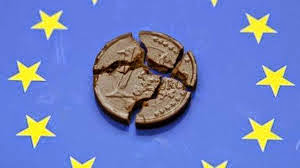 The EU Summit starts today. There are three important issues: Russia, Juncker's investment scheme, and Greece.
The EU Summit starts today. There are three important issues: Russia, Juncker's investment scheme, and Greece.Russia's woes have not been sufficient to spur a change in behavior from Putin. His press conference today was strident, blaming the US and EU for undermining Russia. He blames foreign influences driving down the rouble. The EU will impose new ban on doing business in Crimea. It will also target Russian companies' oil and gas exploration in the Black Sea. The US Congress has authorized Obama to extend sanctions against Russia as well.
Ironically, Russia wants to be respected as a global power, and it does have nuclear weapons. However, failure to diversify the economy away from low valued added commodity production makes more like developing country. And it has just gotten a lot smaller. The rouble's 45% depreciation will slash the size of the economy, which is also contracting in its own right. The combination of the decline in the rouble and the stock market has seen the value of Russian companies more than halved.
Juncker's investment project will be easily approved. Although the headline figure is for 315 bln, euros, the actual money involved is 21 bln euros and it will be coming largely from existing resources. This means no country has to pony up more funds. The effectiveness of the program is a different matter. First it will take several months for the program to be launched, and therefore offer nothing in the first half of 2015.
The funds will be leveraged a few times before offering a guarantee for the first losses. They are for public-private projects. The early response make it seem as if many countries suggest the funds are being viewed as another public works initiative, which means highly politicize boondoggles. Indeed, the head of the European Investment Bank, which is going to oversee the implementation, does not want national interest to dictate which projects are pursued by the EIB. EU government have submitted nearly $2 trillion of projects.
As initially conceived, Juncker's plan did not address how the funds should be distributed by country. Some countries, like Portugal, for example, where public investment has fared better than in many other countries, might not get "its share" of funds. In addition, Juncker's plan anticipates regulatory changes, such as in energy policy and rules governing competition. It is not clear, though how these are going to come about or when.
The EU leaders will also discuss Greece. Greece is seeking an 2-month extension of its current aid program, followed by a precautionary line of credit to be issued by the European Stability Mechanism. However, these concessions may not prove sufficient to stabilize the situation in Greece. The most immediate threat is not form economics but politics.
The presidential selection process is currently under way. There can be three rounds in parliament. The first two need 2/3 majority to approve the presidential candidate. The last round only needs 180 votes. The government has 155 and it secured another 5 in the first round yesterday. Next week (December 23) is the second round. Most certainly there will be a third round held on December 29.
If in the third round the parliamentary support is still not sufficient, parliament must be dissolved within ten days and an elections must be held within three weeks. By tradition, the election would be held on a Sunday. That means that the election could be held on January 25 or February 1. That is to say, Greek election most likely will be a few days or a week after the ECB's January 22 meeting that is widely expected to announce a new asset purchase plan that could include sovereign bonds.
Opinion polls show that the anti-austerity Syriza party enjoys a small lead. Syriza wants roll back some of the austerity measures and wants the official creditors that hold the lion's share of Greek debt to forgive some part of it. That would seem to be an awkward time for the ECB to start buying sovereign bonds that could include Greek bonds.
Although Syriza's political agenda is extreme in Greece, they enjoy an uncommon supporter: Bloomberg editors. They say that "the dispute is haunting international investors again because the European Union in general, and Germany in particular, refuses to write off any part of Greece's sovereign debt," Yet Germany does not hold Greek bonds. The EU does. The IMF does. The ECB does. And if the Troika forgives part of Greece's debt, why should they not forgive part of Italy's debt? Is it any more sustainable? And why not Portuguese and Irish debt too? And what of little Cyprus?
The Bloomberg editors calls for debt forgiveness in exchange for deep economic reforms, which may sound good, but for which there is no constituency. As they note, the Samaras-led coalition government failed to enact the range of reforms that it was committed. It is not clear the kind of structural reforms Syriza will support.
The Troika already indicated that when Greece reaches certain objectives, like the primary budget balance that it would consider lengthening maturities and reducing rates. However, this needs to be negotiated, and what many observers, including the Bloomberg editors, do not seem to appreciate is that the Troika are not just any creditors. This the official sector. Who pays for the debt forgiveness? Not shareholders, but taxpayers.
EU Summit: Light but Little Illumination
 Reviewed by Marc Chandler
on
December 18, 2014
Rating:
Reviewed by Marc Chandler
on
December 18, 2014
Rating:
 Reviewed by Marc Chandler
on
December 18, 2014
Rating:
Reviewed by Marc Chandler
on
December 18, 2014
Rating:





